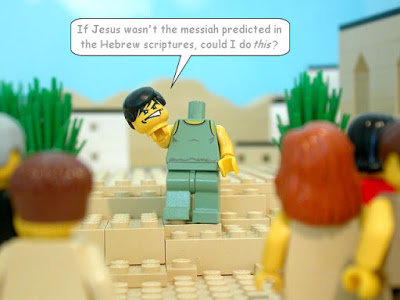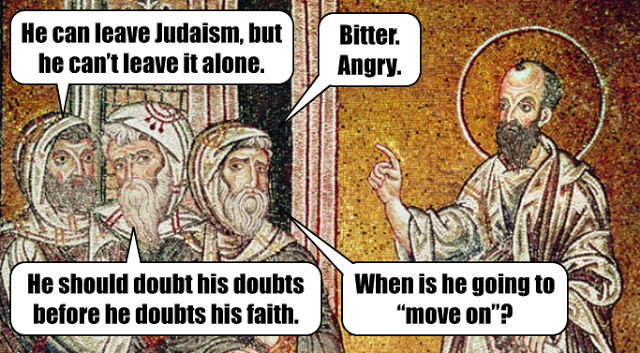“The Number of the Disciples Was Multiplied”
Acts 6–9
LDS manual: here
Purpose
To encourage readers not to “leave it alone”.
Reading
This lesson is where we meet a young upstart by the name of Saul / Paul. (We’ll call him Spaul for convenience.) Spaul never met Jesus in person, but he would take over his racket. With his penchant for telling people how to live their lives, his hatred of women, and his boorish style of declamation, he would be the most influential Christian of all time (Jesus not excluded). He would also serve as a model for thousands of the asshole evangelists who plague college campuses in our day.
Main ideas for this lesson
The stoning of Stephen
We start this reading with a disciple named Stephen, who was doing stuff.
Acts 6:8 And Stephen, full of faith and power, did great wonders and miracles among the people.
But then he ran afoul of “certain of the synagogue”. Side note: it really looks like anti-Jewish sentiment was firmly entrenched by this time in Christianity’s history.
Acts 6:9 Then there arose certain of the synagogue, which is called the synagogue of the Libertines, and Cyrenians, and Alexandrians, and of them of Cilicia and of Asia, disputing with Stephen.
6:10 And they were not able to resist the wisdom and the spirit by which he spake.
Stephen is hauled up before the council, and makes his defence. This takes up all of chapter 7 (it’s long, too), and is essentially an entry for a “Summarise the Old Testament” contest. In a synagogue. Where he says stuff like this:
Acts 7:51 Ye stiffnecked and uncircumcised in heart and ears, ye do always resist the Holy Ghost: as your fathers did, so do ye.
“Not bad summarising, Stephen. But you could have tightened it up a bit by saying, ‘Moses did a bunch of stuff… and YOU SUCK!'”
By the way, it would have been difficult for them to have resisted the Holy Ghost; according to Jesus, the Holy Ghost hadn’t been sent yet.
And then Stephen gets stoned.
Acts 7:54 When they heard these things, they were cut to the heart, and they gnashed on him with their teeth.
7:55 But he, being full of the Holy Ghost, looked up stedfastly into heaven, and saw the glory of God, and Jesus standing on the right hand of God,
7:56 And said, Behold, I see the heavens opened, and the Son of man standing on the right hand of God.
7:57 Then they cried out with a loud voice, and stopped their ears, and ran upon him with one accord,
7:58 And cast him out of the city, and stoned him: and the witnesses laid down their clothes at a young man’s feet, whose name was Saul.
7:59 And they stoned Stephen, calling upon God, and saying, Lord Jesus, receive my spirit.
7:60 And he kneeled down, and cried with a loud voice, Lord, lay not this sin to their charge. And when he had said this, he fell asleep.
And this takes us up to where we meet Spaul.
Saul’s transition
Saul is traveling to Damascus, when the Big Guy puts the hurt on him.
Acts 9:3 And as he journeyed, he came near Damascus: and suddenly there shined round about him a light from heaven:
9:4 And he fell to the earth, and heard a voice saying unto him, Saul, Saul, why persecutest thou me?
9:5 And he said, Who art thou, Lord? And the Lord said, I am Jesus whom thou persecutest: it is hard for thee to kick against the pricks.
9:6 And he trembling and astonished said, Lord, what wilt thou have me to do? And the Lord said unto him, Arise, and go into the city, and it shall be told thee what thou must do.
9:7 And the men which journeyed with him stood speechless, hearing a voice, but seeing no man.
Ask: Did the men who were with Spaul hear a voice or see anyone?
Answer: According to Acts 9:7, yes to the voice and no, respectively. But when Spaul tells the story again later, he’s forgotten some details because now the answers are “no to the voice, and yes to the light.”
Acts 22:7 And I fell unto the ground, and heard a voice saying unto me, Saul, Saul, why persecutest thou me?
22:8 And I answered, Who art thou, Lord? And he said unto me, I am Jesus of Nazareth, whom thou persecutest.
22:9 And they that were with me saw indeed the light, and were afraid; but they heard not the voice of him that spake to me.
Stories can change in the retelling, especially if they’re fictional stories.
Should we fight error?
Let’s talk about “kicking against the pricks”.
When people leave the church, members have a range of strategies to minimise their credibility. Many of these could have been used against Spaul.
Ask: If you have left the church, how many of these have been used against you?
The “can’t leave it alone” idea is especially rank, coming as a criticism from Mormons. When you believe it, you’re supposed to shout it from the housetops, but if you no longer believe it, you’re supposed to… what… disappear? This is a way of silencing people who disagree.
And it’s not like the church leaves people alone. It doesn’t leave people alone when missionaries come around to knock on their door. It doesn’t leave member kids alone when they turn 19, and it’s time to serve a mission. (Did I say 19? Now it’s 18. Apparently they were losing too many kids during that first year of learning at uni.) And they haven’t left gay people alone — they’re still spreading their homophobic message, as ever. So this “can’t leave it alone” thing is just silly. Members need to knock it off.
Even in the post-Mormon community, there’s this idea that it’s not healthy to keep fighting the church, or to keep talking or writing about it. There’s some expectation that you leave the church, you start your blog, and then after a while, you’re supposed to “move on”.
Me, I hope I never get out of the scene. I got reasons.
- Mormonism is interesting! And with the ongoing revelations of polygamy and magic rocks, it’s never been interestinger! So who wouldn’t want to keep talking and writing about this slow-motion trainwreck? (Hey, maybe that’s what ‘continuing revelation’ means — the church keeps revealing things about its history to its members.)
- I need to remember that sometimes I can be wrong — really wrong! When you get a wrong idea, it’s possible to build up defences around it. I did that once, and I don’t want to do it again. My Mormon experience helps me to remember my human fallibility.
- The church is a pernicious entity that harms people. Once it gets its hooks into someone — with all the attendant logical loops and thought-stopping clichés — it’s hard for them to get out. And they’ll be paying the church all the while. If you’re concerned about scam artists and bad reasoning, then the LDS Church (as with religion in general) is definitely something to be concerned about.
And besides, we used to belong to a faith that taught that it was important to keep old wrongs and injustices firmly in mind.
D&C 123:13 Therefore, that we should waste and wear out our lives in bringing to light all the hidden things of darkness, wherein we know them; and they are truly manifest from heaven—
14 These should then be attended to with great earnestness.
Additional lesson ideas
Simony
You never know who the church is going to attract. A lot of people who are poor thinkers in one area tend to be poor thinkers in another. (It may have a lot to do with intellectual character.)
Anyhow, one of the early converts was a magician named Simon.
Acts 8:18 And when Simon saw that through laying on of the apostles’ hands the Holy Ghost was given, he offered them money,
8:19 Saying, Give me also this power, that on whomsoever I lay hands, he may receive the Holy Ghost.
8:20 But Peter said unto him, Thy money perish with thee, because thou hast thought that the gift of God may be purchased with money.
Simon’s contribution to the language is that of simony, the sin of selling church offices, or taking money for spiritual things.
In the LDS Church, simony takes the form of requiring that tithing be paid in order to get a temple recommend so that one can maintain their temple covenants and attain salvation thereby.
If you decide to mention this in a real Gospel Doctrine class, please let us know how it went in comments. See you next week.


Recent Comments